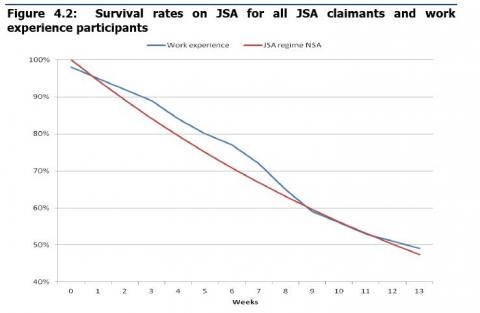Workfare does not work
On the 1st of April 2011, following a review of the evidence, the Social Security Advisory Committee’s report was damning. It advised the government not to introduce Mandatory Work Activity, and observed the following:
- “Published evidence is at best ambivalent about the chances of ‘workfare’ type activity improving outcomes for people who are out of work.”
- “We are concerned that mandating an individual to this scheme could also have the opposite effect to the one intended.”
- “This seems to us to signal that being mandated to mandatory work activity is regarded as a punishment…”
In June 2012, peer-reviewed research by the DWP concluded that Mandatory Work Activity had “no impact on the likelihood of being employed compared to non-referrals.”. The trial of a scheme involving 6 month long workfare placements was found to also have no effect on helping people find work.
This graph shows that the statistics currently available demonstrate that workfare makes no difference to employment outcomes. As Ben Goldacre concluded: “Bottom line: it turns out people leave JSA at roughly the same rate, whether they’re doing workfare or not.”

This means the government’s repeated claims that 50% of people who have undertaken workfare on the Work Experience scheme have either found work or stopped claiming are incredibly misleading. More on why this is the case here.
As far back as 2008, research for the DWP on workfare concluded that:
“There is little evidence that workfare increases the likelihood of finding work. It can even reduce employment chances by limiting the time available for job search and by failing to provide the skills and experience valued by employers.”
“Workfare is least effective in getting people into jobs in weak labour markets where unemployment is high.”
In fact workfare has been a failure wherever it has been implemented.
The success of the Work Programme is being seriously questioned as well: See this summary from February 2013.
In January 2012, a report from the National Audit Office stated that there was: “a significant risk” that ministers’ assumptions about the numbers who can be found jobs may be “over-optimistic”.